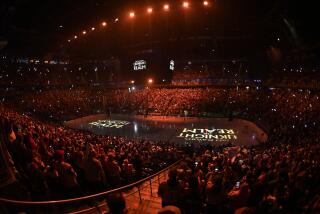Talks Open Intriguing Possibility of Soviets Someday Playing in NHL
- Share via
MONTREAL — The Russians are not coming. Not very many anyway.
Recent statements by Soviet sports officials suggest that Soviet players may soon be made available to the NHL, conjuring up visions of Sergei Makarov scoring the game-winning goal in some future Stanley Cup final.
However, several key hockey negotiators say such visions are pure fantasy.
“I don’t see a big group of them taking over the NHL at this point,” said Alan Eagleson, Director of the NHL Players’ Association. “I don’t see any of their top stars coming.”
While only the most optimistic believe the cream of Soviet hockey will someday play for North American teams, the possibility of the Soviets’ lesser lights skating for NHL teams as early as the 1988-89 season has been a hot topic during the Canada Cup tournament.
Soviet Deputy Minister of Sports Viachesalav Gavralin recently met with NHL President John Ziegler and Eagleson at the league offices to discuss possible players exchanges. A release issued by the NHL gave no indication of what might develop as a result of the meeting, and Eagleson predicted that no collaboration between hockey’s superpowers is in the immediate future.
“There are possibilities, but not probabilities,” Eagleson said. “We met for about eight hours, and the main thrust of the talks was if and when Soviets come to play in the NHL, it would be on the same basis any other players come. That is, they’ll have to be drafted, and they’ll have to play under standard NHL contracts.
“I’ll be surprised if they permit any of their top players to come. And I don’t think there will be a spate of defections as there was with the Czechoslovakians.”
The USSR reportedly has given permission for defensemen Vladimir Zybkov and Fedor Konarekin and perhaps others to play in the NHL after the upcoming season. Although some NHL teams have drafted Soviet players, neither Zybkov, 29, nor Konarekin, 32, have been selected, so it was unclear for which team they might play. The Soviets would prefer they play together, for a contending team.
Neither defenseman plays for the National Team, but they are considered better than average players in the top Soviet league. Both are potential coaches in their homeland, and presumably are loyal enough to their homeland not to defect to the West.
Several teams, and the New Jersey Devils in particular, are following such developments with great interest. In their first draft, they selected Viacheslav Fetisov, the National Team captain, and Alexei Kasatonov, the Soviet’s first-line defensemen.
“They’d look right at home in our (red) home uniforms, wouldn’t they,” Devils General Manager Max McNab mused.
The Vancouver Canucks have not been satisfied to wait for the NHL to work out an official policy with the USSR, and have pursued the matter on their own.
Last year, the Canucks engineered an exchange of coaches, with the Soviets’ Anatoli Tarasov, considered the father of Soviet international hockey, spending an NHL season in North America with Vancouver, and Canucks assistant Jack McIlhargey sharing the NHL style with the USSR. In addition, Canucks’ minor league goaltender Troy Gamble made the trip to study under former Soviet great Vladisov Tretiak.
Most NHL officials agree with Eagleson and do not expect the Soviets to allow their premier players to jump to the NHL, but some could envision some others making the move. The Soviets’ motives for sanctioning such moves are three-fold.
If their second-line stars are successful, it would enhance the reputation of their system, and those players could return to the National Team for international tournaments with the knowledge of what it takes to be successful against NHL-style competition. And from a purely capitalist standpoint, the Soviet program would appreciate the huge amounts of money that might be commanded for the signing rights to their players.
Not everyone in the NHL is eager to see Soviets playing in the NHL. Teams that have ignored Soviets in past drafts do not want to be burned by the teams that have taken the gamble.
“I would be very surprised to see any of the Soviet players from their top team ever playing in the NHL,” said Hartford Whalers General Manager Emil Francis, who owns the rights to no Soviets, “unless they’re old enough to collect Social Security.”
McNab, who has reason to hope otherwise, believes something dramatic could develop this spring.
“I have a feeling it could be done after the Olympics,” said McNab, who added he, like most others, have had little success predicting what the Soviets might do. “Perhaps they will reward some of their players if the perform well at Calgary. That’s just a guess, though.”
More to Read
Go beyond the scoreboard
Get the latest on L.A.'s teams in the daily Sports Report newsletter.
You may occasionally receive promotional content from the Los Angeles Times.






